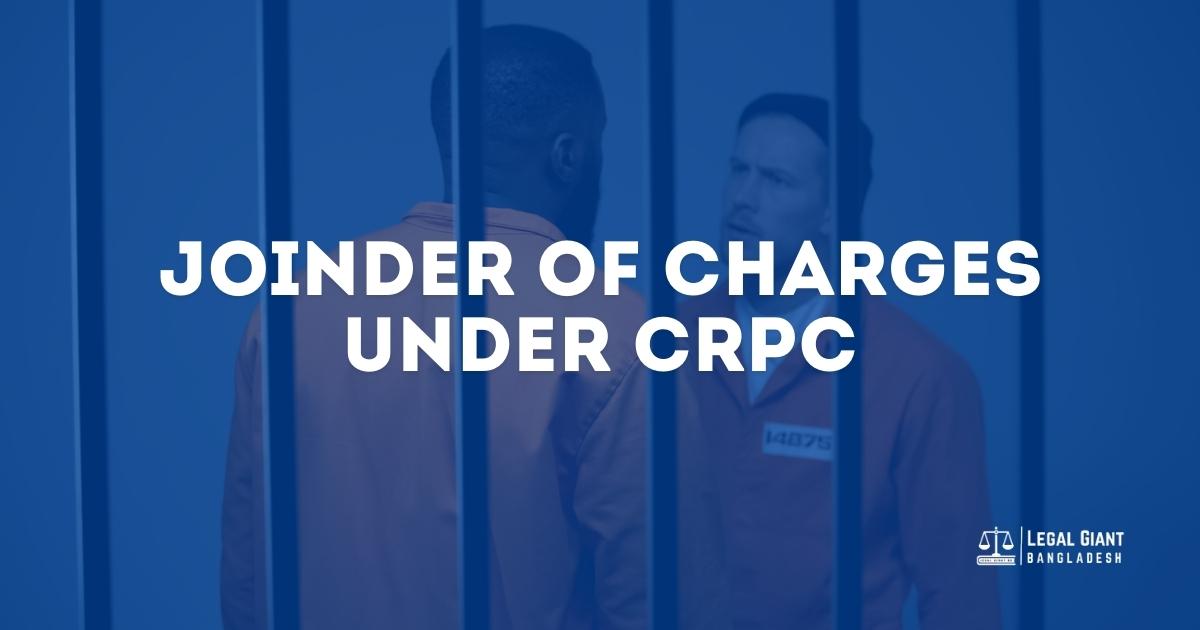The concept of Joinder of Charges in the Code of Criminal Procedure, 1898 (CrPC) governs how multiple charges or offenses against an accused person can be combined in a single trial. This is covered primarily under Sections 233 to 240 of the CrPC in Bangladesh.

Key Provisions on Joinder of Charges under CrPC:
- Section 233: Single Charge for Each Offense
- As a general rule, for every distinct offense, there should be a separate charge, and each charge should be tried separately.
- This ensures clarity and avoids confusion in the trial process.
- Section 234: Joinder of Charges for Similar Offenses
- A person may be charged and tried for up to three offenses of the same kind committed within 12 months from the first offense.
- Offenses are considered “of the same kind” if they are punishable under the same section of law or sections with similar provisions.
- Section 235: Trial of Multiple Offenses in One Transaction
- If several offenses form part of the same transaction, they can be joined in one charge and tried together.
- For instance, if theft and subsequent possession of stolen property occur as part of one act, both offenses may be tried jointly.
- Section 236: Uncertainty about Specific Offense
- When it is unclear which specific offense has been committed, the accused can be charged with all possible offenses, and evidence will determine the applicable one.
- Section 239: Trial of Multiple Accused
- Persons accused of committing different offenses within the same transaction may be tried together.
- Similarly, individuals committing similar offenses in a concerted manner or with a common intention can also be jointly tried.
- Section 240: Framing of Charges
- The magistrate must carefully frame charges when multiple offenses are included to ensure legal compliance with the joinder rules.
Practical Considerations:
- Judicial Discretion: Courts have discretion to allow joinder to streamline the trial while ensuring fairness to the accused.
- Avoiding Prejudice: If joinder is likely to confuse the jury or prejudice the accused, courts may order separate trials.
Read More: Criminal Courts in Bangladesh
Notable Cases on Joinder of Charges:
In the case of K. Satwant Singh v. State Of Punjab (AIR 1960 SC 266), it was established that the rules about joining charges are not mandatory. Several landmark cases in Bangladesh and other jurisdictions have addressed Joinder of Charges under the Code of Criminal Procedure (CrPC). These cases highlight how the courts interpret and apply the relevant provisions, such as Sections 233 to 240 of the CrPC.
- Abdul Majid v. State (28 DLR 1981)
- Facts: The accused was charged with multiple offenses arising out of a single transaction. The trial court combined all the charges in one trial.
- Decision: The High Court upheld the trial court’s decision, stating that offenses arising from the same transaction could be tried together under Section 235 of the CrPC. This ensures efficiency and prevents unnecessary duplication of proceedings.
- State v. Abdul Kuddus (1994 BLD 122)
- Facts: The accused was charged with multiple thefts over a short period, and the charges were combined under Section 234.
- Decision: The court ruled that joinder was valid because the offenses were of the same kind and occurred within 12 months.
- State v. Abu Bakar Siddique (41 DLR 123)
- Facts: Charges included both theft and receiving stolen goods, allegedly from a continuous transaction.
- Decision: The court emphasized that charges for offenses in the same transaction could be joined to avoid fragmented trials. However, the court stressed that the prosecution must establish the link between the offenses.
- Nazir Hossain v. State (45 DLR 1993)
- Facts: The accused was tried for multiple offenses without clear evidence connecting the charges.
- Decision: The court held that improper joinder of charges could result in prejudice to the accused. It reiterated that charges should only be joined when they meet the criteria under Sections 233–235.
- Mohammad Siddique v. State (AIR 1955 SC 196)
- This case from India, based on similar CrPC provisions, dealt with multiple accused being tried together for conspiracy and related acts.
- The court clarified that joinder is permissible when offenses are part of the same transaction or series of acts done in furtherance of a common intention.
Key Principles from These Cases:
- Efficiency: Joinder of charges is meant to reduce multiplicity of trials and save judicial resources.
- Fairness: Courts must ensure that joinder does not cause confusion or prejudice the accused.
- Same Transaction: Charges can be joined if they arise out of the same incident or a continuous series of actions.
- Judicial Discretion: Courts have significant discretion to decide on joinder, considering the facts and circumstances.
If you have a specific case or query in mind, providing details will allow me to offer more tailored insights.


